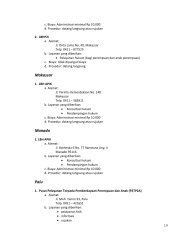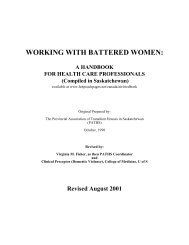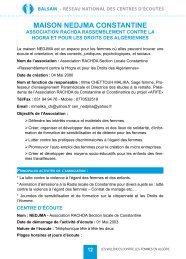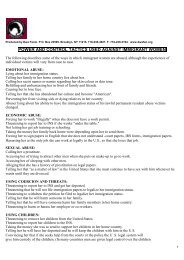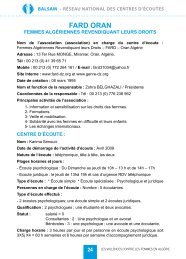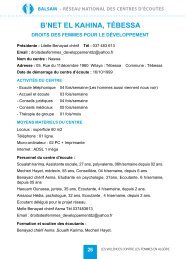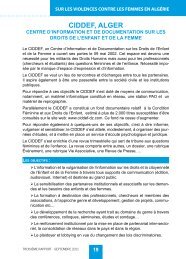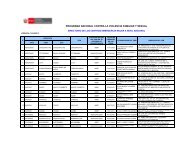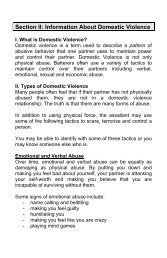Domestic Violence Counseling Manual - Hot Peach Pages
Domestic Violence Counseling Manual - Hot Peach Pages
Domestic Violence Counseling Manual - Hot Peach Pages
You also want an ePaper? Increase the reach of your titles
YUMPU automatically turns print PDFs into web optimized ePapers that Google loves.
MENTAL PREPERATION<br />
When someone experiences or lives with domestic violence there are also five main mental phases that<br />
they go through in coping with the abuse. It is necessary to move through these phases in order to try to<br />
leave a domestic violence situation. These stages are:<br />
1. Shock/Denial<br />
2. Bargaining: Tries to talk to or reason with the abuser<br />
3. Anger<br />
4. Depression (and realization): Rage is turned inwards, in extreme cases it can result in suicide<br />
5. Acceptance: This is the stage where the abused is able to take action (usually in the tension or<br />
explosion stage of the violence cycle).<br />
It may take weeks, months, or years to reach the final stage. It may never be reached. In order to reach<br />
this stage it is sometimes necessary to hit rock bottom, to reach the point where you have to move<br />
somewhere and the only place is up. Even once the victim reaches this phase, she still needs to:<br />
1. Seek emotional support and practical help<br />
2. Make a crisis safety plan to help keep her and her children safe<br />
3. Get advice about her legal rights and the appropriate procedures<br />
It is extremely important to note that the victim must be the one to move herself through these<br />
phases. It is, of course, helpful and almost necessary to have someone they can trust to talk to and rely<br />
on for support—however this does not mean that you should take over the practical aspects of the process<br />
for the victim. Resist the tendency to treat her as a helpless child and do everything for her. For her to be<br />
able to successfully leave her abuser and rebuild her life she must be in control. This will help her to<br />
regain confidence in herself and her ability to be self-sufficient.<br />
PRACTICAL CHECKLIST (IF YOU’RE STAYING IN THE ABUSIVE RELATIONSHIP)<br />
Identify waning signs of abuse:<br />
• Specific words and behaviors that precede a violent incident<br />
• Specific actions or looks of your partner that inspire fear in you<br />
Take actions before a violent incident to insure your protection:<br />
• Create a list of emergency numbers and try to memorize it<br />
24-56



